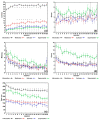Functional Living Skills: A Non-Immersive Virtual Reality Training for Individuals with Major Neurocognitive Disorders
- PMID: 34502642
- PMCID: PMC8433763
- DOI: 10.3390/s21175751
Functional Living Skills: A Non-Immersive Virtual Reality Training for Individuals with Major Neurocognitive Disorders
Abstract
The loss of functional living skills (FLS) is an essential feature of major neurocognitive disorders (M-NCD); virtual reality training (VRT) offers many possibilities for improving FLS in people with M-NCD. The aim of our study was to verify the effectiveness of a non-immersive VRT on FLS for patients with M-NCD. VRT was carried out for 10 to 20 sessions, by means of four 3D apps developed in our institute and installed on a large touch screen. The experimental group (EG) and the control group (CG) included 24 and 18 patients with M-NCD, respectively. They were administered the in vivo test (in specific hospital places reproducing the natural environments) at T1 (pre-training) and T3 (post-training); at T2, only EG was administered VRT. Statistically significant differences between EG and CG in all the in vivo tests were found in the number of correct responses; during VRT, the number of correct responses increased, while the execution times and the number of clues decreased. The improvement in the in vivo tests appeared to be related to the specific VRT applied. The satisfaction of participants with the VRT was moderate to high.
Keywords: dementia; functional living skills; neurocognitive disorder; virtual reality.
Conflict of interest statement
The authors declare no conflict of interest.
Figures

References
-
- American Psychiatric Association . Diagnostic and Statistical Manual of Mental Disorders. 5th ed. American Psychiatric Publishing; Arlington, VA, USA: 2013.
-
- Roley S.S., DeLany J.V., Barrows C.J., Brownrigg S., Honaker D., Sava D.I., Talley V., Voelkerding K., Amini D.A., Smith E., et al. Occupational therapy practice framework: Domain & practice, 2nd edition. Am. J. Occup. Ther. Off. Publ. Am. Occup. Ther. Assoc. 2008;62:625–683. doi: 10.5014/ajot.62.6.625. - DOI - PubMed
-
- Allain P., Foloppe D.A., Besnard J., Yamaguchi T., Etcharry-Bouyx F., Le Gall D., Nolin P., Richard P. Detecting everyday action deficits in Alzheimer’s disease using a nonimmersive virtual reality kitchen. J. Int. Neuropsychol. Soc. JINS. 2014;20:468–477. doi: 10.1017/S1355617714000344. - DOI - PubMed
MeSH terms
Grants and funding
LinkOut - more resources
Full Text Sources

